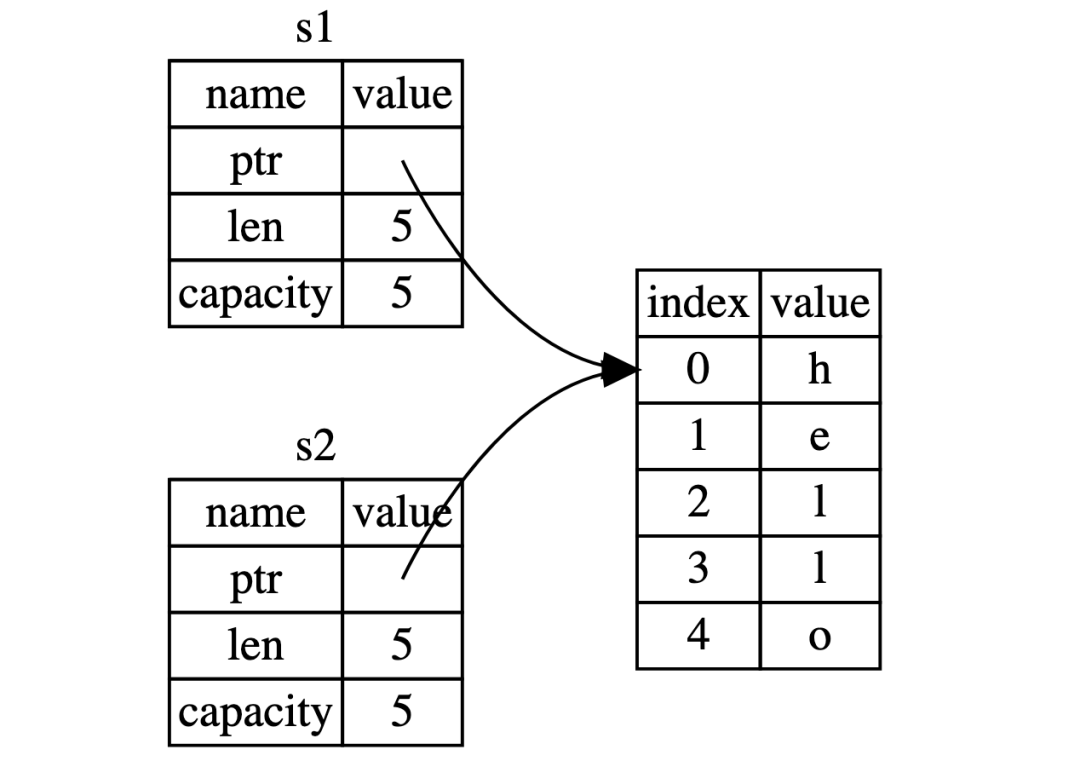Rust Ownership 三原则
Rust 最核心的概念就是 Ownership 所有权,带 GC 功能的语言,可以在运行期由 runtime 扫堆内存,释放没有被引用的垃圾对象,比如现在用的 go. 对于像 c/c++ 这类语言,就需要用户自行管理内存的分配与释放
而 Rust 采用 Ownership 的概念,并在编译器附加各种检查规则,来实现内存管理。注意,Rust 大部分工作都是在编译期完成,所以运行时没有额外开销。下面是三原则:
- 每个值 value, 都有一个所有者 owner
- 同一时间,一个值只能有一个所有者 owner
- 当所有者 owner 离开作用域,对应的值会自动 dropped
RAII
先来看一下离开作用域,自动释放
fn main() {
let _s = String::from("hello");
}最简单的代码,只有一行,在堆上分配字符串,反汇编观察下如何管理内存
Dump of assembler code for function hello_cargo::main:
src/main.rs:
1 fn main() {
0x000055555555d190 <+0>: sub $0x18,%rsp
2 let _s = String::from("hello");
0x000055555555d194 <+4>: mov %rsp,%rdi
0x000055555555d197 <+7>: lea 0x2bf86(%rip),%rsi # 0x555555589124
0x000055555555d19e <+14>: mov $0x5,%edx
0x000055555555d1a3 <+19>: callq 0x55555555c480 <<alloc::string::String as core::convert::From<&str>>::from>
3 }
=> 0x000055555555d1a8 <+24>: mov %rsp,%rdi
0x000055555555d1ab <+27>: callq 0x55555555c700 <core::ptr::drop_in_place<alloc::string::String>>
0x000055555555d1b0 <+32>: add $0x18,%rsp
0x000055555555d1b4 <+36>: retq
End of assembler dump.第 2 行的汇编,调用 core::convert::From 创建字符串变量。然后第 3 行,main 结束时,自动调用 core::ptr::drop_in_place 释放字符串,这行代码由编译器添加
离开作用域自动析构,这一点很像 c++ 的 RAII (Resource Acquisition Is Initialization), 只不过 rust 是离开作用域调用 drop trait
所有权
fn main() {
let s1 = String::from("hello");
let s2 = s1;
println!("s1 = {}, s2 = {}", s1, s2);
}这段代码,如果是 go 肯定可以运行,但是 rust 不行
hello_cargo# cargo run
Compiling hello_cargo v0.1.0 (/root/zerun.dong/code/rusttest/hello_cargo)
error[E0382]: borrow of moved value: `s1`
--> src/main.rs:5:34
|
2 | let s1 = String::from("hello");
| -- move occurs because `s1` has type `String`, which does not implement the `Copy` trait
3 | let s2 = s1;
| -- value moved here
4 |
5 | println!("s1 = {}, s2 = {}", s1, s2);
| ^^ value borrowed here after move执行报错,因为 s1 值的所有权己经 move 给 s2 了,原来的 s1 己经处于不可用状态。move occurs because s1 has type String, which does not implement the Copy trait
可以看一下字符串的实现,和 go 一样,string header 里面有 pointer 指向堆内存。如果 s1, s2 浅拷贝,同时将 pointer 指向堆上的数据,那么离开作用域后,会将同一片内存释放两次!!!
fn main() {
let s1 = String::from("hello");
let s2 = s1.clone();
println!("s1 = {}, s2 = {}", s1, s2);
}可以调用 s1.clone() 进行深拷贝,解决这个问题。但是每次都进行内存复制很低效,所以后面会介绍 引用 references 的概念
所有权与函数
fn main() {
let s = String::from("hello"); // s comes into scope
takes_ownership(s); // s's value moves into the function...
// ... and so is no longer valid here
let x = 5; // x comes into scope
makes_copy(x); // x would move into the function,
// but i32 is Copy, so it's okay to still
// use x afterward
} // Here, x goes out of scope, then s. But because s's value was moved, nothing
// special happens.
fn takes_ownership(some_string: String) { // some_string comes into scope
println!("{}", some_string);
} // Here, some_string goes out of scope and `drop` is called. The backing
// memory is freed.
fn makes_copy(some_integer: i32) { // some_integer comes into scope
println!("{}", some_integer);
} // Here, some_integer goes out of scope. Nothing special happens.这是官网的一个例子,当 takes_ownership 执行时,s 对应值的所有权就转移到函数中了,离开作用域后进行释放,如果 main 函数想再使用就会报错
但是同时,x 是一个 int 值,makes_copy 函数执行会 copy 这个 value, 而不是转移所有权
Move, Copy 与 Clone
在 Rust 中,如果类型没有实现 Copy, 那么该类型进行赋值,传参,返回值时都是 Move 语义,有点拗口,不直观
上一段字符串就是一个 Move, 来看一个整型例子
zerun.dong$ cat src/main.rs
fn main() {
let s1 = 1234;
let s2 = s1;
println!("s1 = {}, s2 = {}", s1, s2);
}
zerun.dong$ cargo run
Finished dev [unoptimized + debuginfo] target(s) in 0.00s
Running `target/debug/hello_cargo`
s1 = 1234, s2 = 1234这里 s1 默认就是 i32 类型,实现了 Copy 语义,所以之后 s1 也可以使用
来看一下哪些类型默认实现了 Copy 语义,一般都是标量,也就是栈上分配,在编译期就确定大小的类型:
- All the integer types, such as u32.
- The Boolean type, bool, with values true and false.
- All the floating point types, such as f64.
- The character type, char.
- Tuples, if they only contain types that also implement Copy. For example, (i32, i32) implements Copy, but (i32, String) does not.
那么对于自定义类型,比如 struct 是如何处理的呢???
struct Data {
a: i64,
b: i64,
}
fn test(d: Data) {
let _d = d;
}
fn main() {
let d = Data{a:1,b:1};
test(d);
println!("a is {}, b is {}", d.a, d.b);
}
zerun.dong$ cargo run
Compiling hello_cargo v0.1.0 (/Users/zerun.dong/code/rusttest/hello_cargo)
error[E0382]: borrow of moved value: `d`
--> src/main.rs:14:39
|
12 | let d = Data{a:1,b:1};
| - move occurs because `d` has type `Data`, which does not implement the `Copy` trait
13 | test(d);
| - value moved here
14 | println!("a is {}, b is {}", d.a, d.b);
| ^^^ value borrowed here after move可以看到,运行报错,原因是 d 在调用 test 时己经 move 走了,所以 main 里不能再使用变量 d. 但问题在于 struct Data 成员都是整型啊,默认都是实现了 Copy 的
#[derive(Copy, Clone)]
struct Data {
a: i64,
b: i64,
}这里需要在 struct 标注一下 #[derive(Copy, Clone)], 这样该自定义类型自动实现 Copy trait, 这里要求所有字段都己经实现了 Copy
enum E1 {
Text,
Digit,
}
struct S2 {
u: usize,
e: E1,
s: String,
}
impl Clone for S2 {
fn clone(&self) -> Self {
// 生成新的E1实例
let e = match self.e {
E1::Text => E1::Text,
E1::Digit => E1::Digit,
};
Self {
u: self.u,
e,
s: self.s.clone(),
}
}
}对于 struct S2, 由于 S2 的 field 中有 String 类型,String 类型没有实现 Copy trait, 所以 S2 类型就不能实现 Copy trait
S2 中也包含了 E1 类型,E1 类型没有实现 Clone 和 Copy trait,但是我们可以自己实现S2类型的 Clone trait, 在 Clone::clone 方法中生成新的 E1 实例,这就可以 clone 出新的 S2 实例
这块概念参考rust中move、copy、clone、drop和闭包捕获[2], 太复杂了,涉及到闭包的,后面再讲。
对于 go 就没这么多事,不确定的直接堆上分配,由 runtime GC 来负责清理垃圾。多个语言,对比学习,还是蛮有意思的 ^_^
参考资料
[1]The Book Understanding Ownership 4.1: https://doc.rust-lang.org/stable/book/ch04-01-what-is-ownership.html,
[2]rust中move、copy、clone、drop和闭包捕获: https://www.jianshu.com/p/ea1b96cbf0a1,
